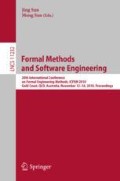Abstract
Connectors have shown their great potential for coordination of different components in the large-scale distributed systems. Formal modeling and verification of connectors becomes more critical due to the rapid growth of the size of connectors. In this paper, we present a novel modeling and verification approach of Reo connectors in Coq, including the timed and probabilistic extensions of Reo. When failing to prove whether a property is satisfiable or not with Coq, Z3 solver can be used to generate counterexamples automatically. To promote automated theorem proving in Coq, we proposed an approach based on recurrent neural networks (RNNs) to predict tactics in the proving process.
Access this chapter
Tax calculation will be finalised at checkout
Purchases are for personal use only
References
Arbab, F.: Reo: a channel-based coordination model for component composition. Math. Struct. Comput. Sci. 14(3), 329–366 (2004)
Arbab, F., Baier, C., de Boer, F., Rutten, J.: Models and temporal logics for timed component connectors. In: Cuellar, J.R., Liu, Z. (eds.) Proceedings of SEFM 2004, pp. 198–207. IEEE Computer Society (2004)
Baier, C., Sirjani, M., Arbab, F., Rutten, J.: Modeling component connectors in Reo by constraint automata. Sci. Comput. Program. 61, 75–113 (2006)
Bridge, J.P., Holden, S.B., Paulson, L.C.: Machine learning for first-order theorem proving - learning to select a good heuristic. J. Autom. Reason. 53(2), 141–172 (2014)
de Moura, L., Bjørner, N.: Z3: an efficient SMT solver. In: Ramakrishnan, C.R., Rehof, J. (eds.) TACAS 2008. LNCS, vol. 4963, pp. 337–340. Springer, Heidelberg (2008). https://doi.org/10.1007/978-3-540-78800-3_24
Hong, W., Nawaz, M.S., Zhang, X., Li, Y., Sun, M.: Using Coq for formal modeling and verification of timed connectors. In: Cerone, A., Roveri, M. (eds.) SEFM 2017. LNCS, vol. 10729, pp. 558–573. Springer, Cham (2018). https://doi.org/10.1007/978-3-319-74781-1_37
Huet, G., Kahn, G., Paulin-Mohring, C.: The Coq proof assistant a tutorial. Rapport Technique, vol. 178 (1997)
Jongmans, S.T.Q., Arbab, F.: Overview of thirty semantic formalisms for Reo. Sci. Ann. Comput. Sci. 22(1), 201–251 (2012)
Kaliszyk, C., Mamane, L., Urban, J.: Machine learning of coq proof guidance: first experiments. In: Proceedings of SCSS 2014. EPiC Series in Computing, vol. 30, pp. 27–34. EasyChair (2014)
Kokash, N., Krause, C., de Vink, E.: Reo+mCRL2: a framework for model-checking dataflow in service compositions. Form. Asp. Comput. 24, 187–216 (2012)
Li, Y., Sun, M.: Modeling and verification of component connectors in Coq. Sci. Comput. Program. 113(3), 285–301 (2015)
Loos, S.M., Irving, G., Szegedy, C., Kaliszyk, C.: Deep network guided proof search. In: Proceedings of LPAR 2017. EPiC Series in Computing, vol. 46, pp. 85–105. EasyChair (2017)
Sun, M., Arbab, F., Aichernig, B.K., Astefanoaei, L., de Boer, F.S., Rutten, J.: Connectors as designs: modeling, refinement and test case generation. Sci. Comput. Program. 77(7–8), 799–822 (2012)
Sun, M., Zhang, X.: A relational model for probabilistic connectors based on timed data distribution streams. In: Jansen, D.N., Prabhakar, P. (eds.) FORMATS 2018. LNCS, vol. 11022, pp. 125–141. Springer, Cham (2018). https://doi.org/10.1007/978-3-030-00151-3_8
Zhang, X., Hong, W., Li, Y., Sun, M.: Reasoning about connectors in Coq. In: Kouchnarenko, O., Khosravi, R. (eds.) FACS 2016. LNCS, vol. 10231, pp. 172–190. Springer, Cham (2017). https://doi.org/10.1007/978-3-319-57666-4_11
Zhang, X., Sun, M.: Towards formal modeling and verification of probabilistic connectors in Coq. In: Proceedings of SEKE 2018, pp. 385–390. KSI Research Inc. and Knowledge Systems Institute Graduate School (2018)
Acknowledgement
The work was partially supported by the National Natural Science Foundation of China under grant no. 61772038, 61532019, 61202069 and 61272160.
Author information
Authors and Affiliations
Corresponding author
Editor information
Editors and Affiliations
Rights and permissions
Copyright information
© 2018 Springer Nature Switzerland AG
About this paper
Cite this paper
Zhang, X. (2018). Modeling and Verification of Component Connectors. In: Sun, J., Sun, M. (eds) Formal Methods and Software Engineering. ICFEM 2018. Lecture Notes in Computer Science(), vol 11232. Springer, Cham. https://doi.org/10.1007/978-3-030-02450-5_26
Download citation
DOI: https://doi.org/10.1007/978-3-030-02450-5_26
Published:
Publisher Name: Springer, Cham
Print ISBN: 978-3-030-02449-9
Online ISBN: 978-3-030-02450-5
eBook Packages: Computer ScienceComputer Science (R0)

